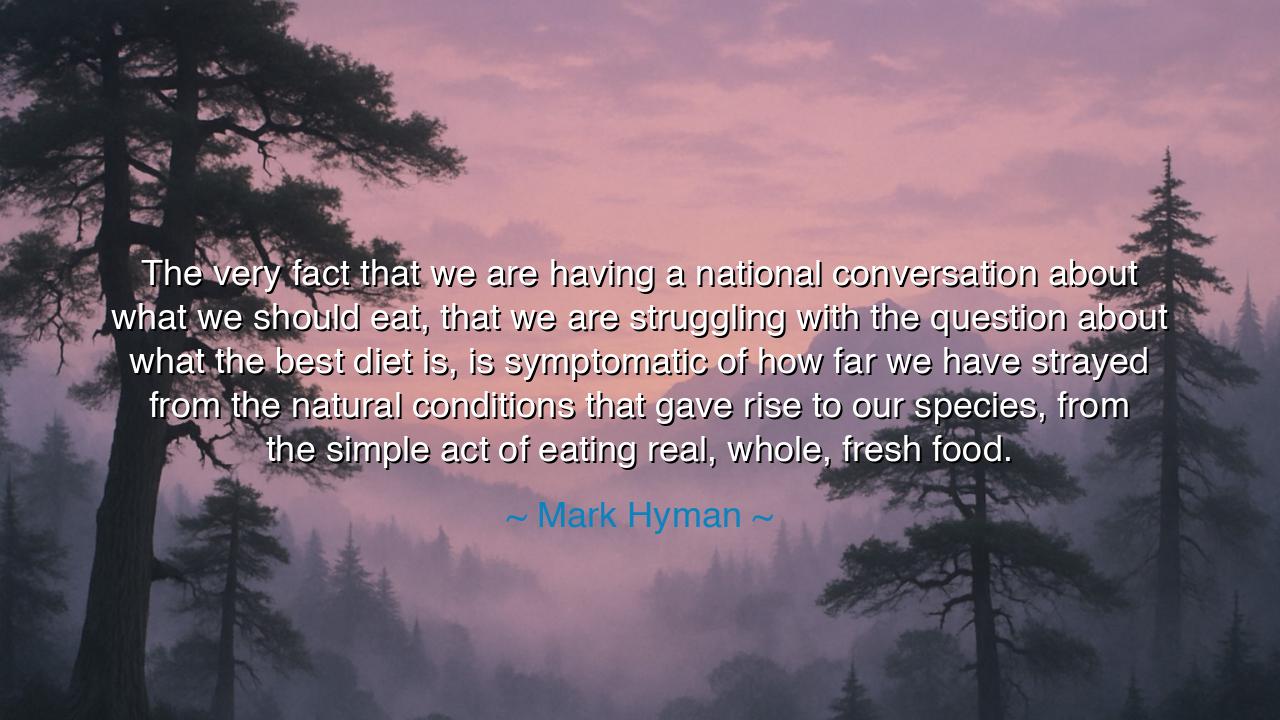
The very fact that we are having a national conversation about
The very fact that we are having a national conversation about what we should eat, that we are struggling with the question about what the best diet is, is symptomatic of how far we have strayed from the natural conditions that gave rise to our species, from the simple act of eating real, whole, fresh food.






In the quiet depths of time, where humanity first emerged from the cradle of the earth, there was no confusion about what to eat. The ancients knew well that the body required the simplest, most natural foods—fruits, vegetables, meat, grains—things that grew from the earth, things that were unprocessed, untouched by the complexities of modern civilization. Mark Hyman's words, “The very fact that we are having a national conversation about what we should eat, that we are struggling with the question about what the best diet is, is symptomatic of how far we have strayed from the natural conditions that gave rise to our species, from the simple act of eating real, whole, fresh food,” reflect the deep truth that the confusion surrounding our food today is a sign of our disconnection from the very nature that once sustained us.
In the time of the Greeks, the connection between food and health was revered. Hippocrates, the father of medicine, once declared, “Let food be thy medicine and medicine be thy food.” This wisdom spoke not of complex diets or restrictive eating habits, but of a return to simplicity, where food is something that heals, nourishes, and strengthens the body. In his world, there was no debate over what should or should not be eaten. The Greeks understood that balance and moderation in consuming natural, whole foods were the cornerstones of health. They did not struggle over the best diet because their meals were simple, fresh, and aligned with the rhythms of nature. The act of eating was an inherent part of life’s balance, not something to be overcomplicated or divided into endless factions.
Similarly, the Romans knew the value of whole foods, and their strength in battle was supported by a diet rich in simple grains, vegetables, and proteins. The historian Pliny the Elder wrote extensively on the importance of eating foods that were natural and fresh. He understood that health was achieved not through excess or deprivation, but through the wise selection of foods that were accessible, sustaining, and nourishing. In Hyman’s observation, the very fact that we are consumed by questions about diets and what is "best" for our health reveals how far we have strayed from this ancient wisdom. In today’s world, we find ourselves mired in complex systems of eating, constantly searching for the right answer, while nature’s simplicity remains the forgotten path.
Hyman’s words echo the concern of the Stoics, who believed that virtue and strength were not achieved through indulgence or restriction, but through a mindful approach to life. Seneca, the great Stoic philosopher, understood that peace and clarity came not from excessive or restrictive behavior, but from the balance in between. The Stoics taught that self-discipline was the path to wisdom, and in this, the wisdom of eating—consuming what nourishes the body without overindulging or depriving—was integral to achieving a life of virtue and strength. It is in this moderation, balance, and awareness of what the body truly needs that we can find true nourishment, a principle that is reflected in Hyman’s call for a return to the basics of eating real, whole food.
The truth, then, is simple: we have lost our way. The debate over diets, the endless search for the "perfect" eating plan, is a sign of our disconnection from the earth, from the natural world that once fed us. Consider the example of Alexander the Great, whose campaigns across vast territories were supported by the simple nourishment of his troops. The soldiers marched long distances, fought fierce battles, and endured hardship, yet their food was simple—meat, grains, and simple vegetables. They did not suffer from the confusion of modern diets. They ate what was necessary to fuel their bodies for the challenges they faced, and in this, they found strength and endurance. The complexity of modern diets only serves to weaken our understanding of what our bodies truly need, as we lose touch with the basic nourishment that once powered us.
The lesson in Hyman’s words is both urgent and profound. We must return to the simple act of eating real, whole, fresh food. No more debates about fads, no more obsession with restriction or excess. We must reconnect with the earth’s bounty, nourishing ourselves with what is fresh, unprocessed, and whole. The ancients knew this, and we must remember it if we are to find the path to true health. It is in the simplicity of eating what the earth provides, with mindfulness and balance, that we will find our way back to vitality and well-being.
Thus, let us heed the wisdom of Hyman and the ancients. Choose food that is natural, that honors the body, and brings it what it needs to thrive—not out of a sense of restriction, but from a place of respect for our bodies and the earth that sustains us. In doing so, we will not only return to the roots of what it means to eat, but we will also reclaim the joy and clarity that comes from nourishing ourselves in the simplest, most whole way. Let us no longer be lost in the maze of complex diets, but let us eat with awareness, simplicity, and gratitude, restoring the ancient balance of mind, body, and spirit.






AAdministratorAdministrator
Welcome, honored guests. Please leave a comment, we will respond soon